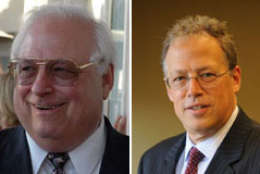Federal Employee Health Benefits
-
A complex regulation change from the Office of Personnel Management opens up a few more options to enrollees in the Federal Employee Health Benefits Program (FEHBP).
April 27, 2018 -
Most federal workers and retirees are covered by one of the dozens of plans and any of them do not need Medicare Part B, but it does offer extra protection.
April 26, 2018 -
President Donald Trump's fiscal 2019 budget request includes several other recommendations that would change current retirement, health and other benefits for federal employees.
February 12, 2018 -
In today's Federal Newscast, a new report from the Homeland Security Department's Office of Inspector General finds the agency has no centralized database to make sure suspended companies don't compete for new contracts.
January 30, 2018 -
In its annual call letter to Federal Employee Health Benefits Program (FEHBP) carriers, the Office of Personnel Management urged insurance companies to consider new ways to cut costs for the next year.
January 29, 2018 -
Do you get emotional when comparing fee-for-service health plans with an HMO? Do you know the difference? Does it really matter?
December 04, 2017 -
OK, so you are a finalist on TV's "Jeopardy!" quiz show, but to win a million dollars, you must bet everything you've already won. It's all or nothing.
November 29, 2017 -
Most federal workers rarely change their health plans. Is that a mistake? Find out when Walton Francis, author of the Checkbook Guide to Health Plans for Federal Employees joins host Mike Causey on this week's Your Turn. November 29, 2017
November 28, 2017 -
Senior Correspondent Mike Causey says you could save a lot of money next year on health insurance if you plan ahead
November 24, 2017 -
Every year, Uncle Sam holds an extensive and expensive open season when federal workers, retirees and their survivors can update, enroll in or change their benefits package.
November 22, 2017 -
It's open season which means federal workers, retirees and their survivors are updating, enrolling in or changing their benefits package. How can you get the best coverage at the lowest premium? Find out when Walton Francis, author of the Consumer's Checkbook Guide to Health Plans for Federal Employees. joins host Mike Causey on this week's Your Turn. November 22, 2017
November 21, 2017 -
If you work for Uncle Sam and are reasonably healthy, there’s a good chance you can get free health insurance next year.
November 21, 2017 -
Whatever advantages the non-fed health plan has while you are both working will likely disappear when your spouse retires.
November 16, 2017 -
Do you need to get Medicare Part B? What are the advantages of an HMO? What’s the difference between a self only plan, a self-plus-one plan and a family plan? Walton Francis, author of the Checkbook Guide to Health Plans for Federal Employees, will answer those questions and more when he joins host Mike Causey on this week's Your Turn.
November 14, 2017 -
If somebody offered you $2,000 for two hours of work and it's not illegal, immoral or fattening, would you take it?
November 14, 2017















